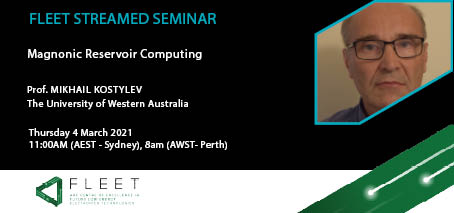-
4 Mar 2021
11:00 am - 12:00 pm
Prof. Mikhail Kostylev
Department of Physics and Astrophysics, The University of Western Australia
If you missed the talk, you can catch it on YouTube
The reservoir computer (RC) is a specific type of a neural network suitable for modelling complex dynamical systems. RC’s relative ease of training and its remarkable computational power, has received great interest in the past decade.
The main part of the RC network is a hidden neurolayer called, “Reservoir”. The practical implementation of the reservoir is not limited to software for digital computers. It may also be implemented as an analogue hardware – any nonlinear dynamical system that meets some criteria may serve as a reservoir. This led to the emergence of a new field of Physical Reservoir Computing.
Recently our group suggested a novel type of physical reservoir. The reservoir functionality is based on nonlinear dynamics of spin waves (magnons in quantum language) in thin magnetic films. My talk will introduce the general concept of Physical Reservoir Computing and show some results of our investigation of the magnonic reservoir we developed and its advantages with respect to its closest competitors from the fields of Spin-Torque Nano-Oscillators and Nonlinear Fibre Optics.
Mikhail Kostylev completed his PhD in Physics at St. Petersburg Electrotechnical University (SPETU), St. Petersburg, Russia in 1993. In 1993-1995 he was a DAAD post-doctoral fellow at the University of Osnabrueck, Germany before returning to SPETU as an Associate Professor. In 2005 he joined the Department of Physics and Astrophysics at the University of Western Australia where he holds a Full-Professor position and is leader of the Spintronics and Magnonics research group. He has co-authored more than 150 publications in this field of research.

